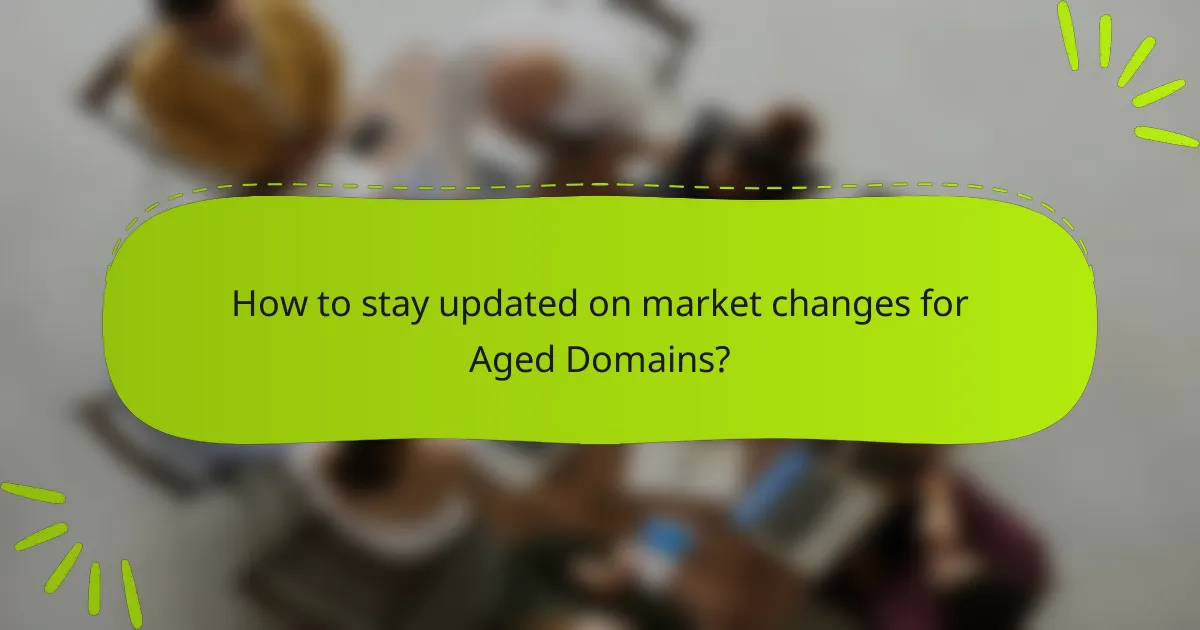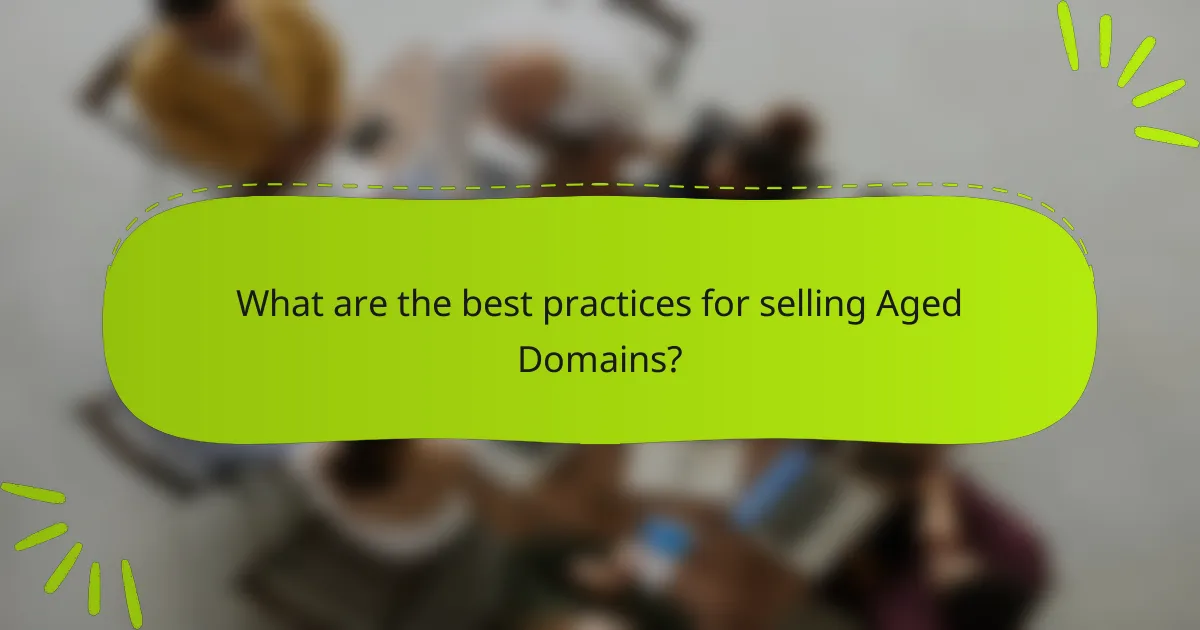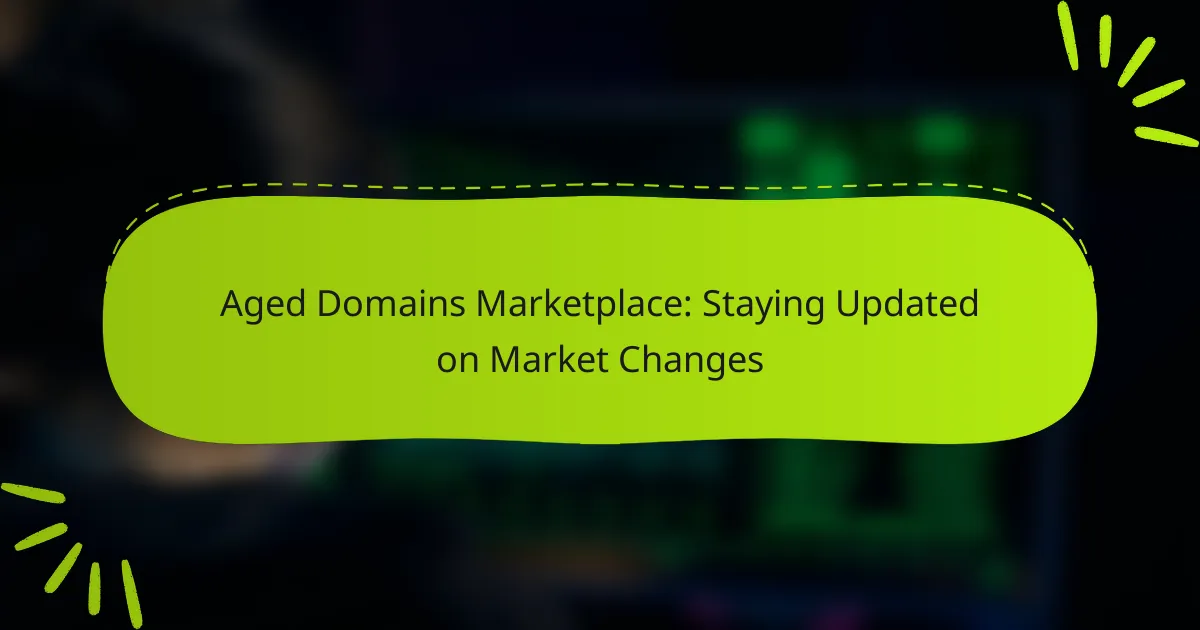The aged domains marketplace is evolving rapidly, making it essential for buyers to stay informed about market changes and trends. Understanding key platforms, evaluating domain quality, and recognizing the importance of factors like backlink profiles and keyword relevance can greatly enhance purchasing decisions. As interest in aged domains grows, so does their potential for improving online visibility and authority, making them a valuable asset for investors.

How to Navigate the Aged Domains Marketplace in Palau?
Navigating the aged domains marketplace in Palau involves understanding key platforms, evaluating domain quality, and employing effective negotiation strategies. Familiarity with local regulations and market trends can significantly enhance your purchasing decisions.
Key platforms for buying aged domains
Several online platforms specialize in the sale of aged domains, making it easier for buyers in Palau to find suitable options. Popular marketplaces include GoDaddy Auctions, Flippa, and Sedo, each offering a range of domains with varying histories and prices.
When using these platforms, consider the user interface and available filters to streamline your search. Look for platforms that provide detailed domain metrics, such as age, backlinks, and traffic statistics, to make informed choices.
Best practices for evaluating domain quality
Evaluating the quality of aged domains requires a systematic approach. Key factors to consider include the domain’s age, backlink profile, and historical traffic data. A domain that has been established for several years with a clean backlink profile is generally more valuable.
Utilize tools like Ahrefs or Moz to analyze the domain’s authority and backlink quality. Avoid domains with a history of spam or penalties, as these can negatively impact your future SEO efforts.
Strategies for negotiating prices
Negotiating prices for aged domains can be a delicate process. Start by researching comparable sales to establish a fair price range. When making an offer, be prepared to justify your price based on the domain’s metrics and market trends.
Consider using a polite but firm approach during negotiations. If the seller is unwilling to lower the price, be ready to walk away and explore other options. Building rapport with the seller can also facilitate better deals.

What are the current trends in Aged Domains?
The current trends in aged domains indicate a growing interest in their potential for enhancing online visibility and authority. Investors are increasingly recognizing the value of these domains for search engine optimization (SEO) and branding purposes.
Increasing demand for SEO-friendly domains
There is a noticeable rise in demand for aged domains that are SEO-friendly, as businesses seek to improve their search rankings. These domains often come with established backlinks and traffic, which can significantly boost a new website’s visibility.
When considering an SEO-friendly domain, look for those with a clean history, relevant keywords, and a strong backlink profile. Avoid domains that have been penalized by search engines, as this can hinder your SEO efforts.
Shift towards premium domain names
The market is witnessing a shift towards premium domain names, which are often shorter, more memorable, and carry higher authority. Businesses are willing to invest more in these domains to secure a competitive edge in their respective markets.
Investors should be prepared to pay a premium for high-quality aged domains, as prices can vary widely based on factors like length, keyword relevance, and market demand. Conduct thorough research to ensure that the investment aligns with your branding and marketing goals.

How to assess the value of an Aged Domain?
To assess the value of an aged domain, consider factors such as its backlink profile, age, and keyword relevance. These elements significantly influence its potential for SEO and overall marketability.
Factors influencing domain valuation
Several key factors affect the valuation of an aged domain. The domain’s age is crucial; older domains often have established authority and trust with search engines. Additionally, the quality and quantity of backlinks play a vital role, as domains with high-quality inbound links tend to rank better.
Keyword relevance is another important aspect. Domains that contain popular or niche keywords can attract more traffic, increasing their value. Other factors include the domain extension (e.g., .com, .org) and the overall market demand for similar domains.
Tools for domain appraisal
There are various tools available for appraising aged domains. Services like Estibot and GoDaddy’s Domain Appraisal provide estimates based on metrics such as traffic, backlinks, and market trends. These tools can give you a ballpark figure but should be used alongside manual assessments.
Additionally, consider using SEO analysis tools like Ahrefs or SEMrush to evaluate the domain’s backlink profile and organic traffic. Combining insights from multiple sources will yield a more accurate valuation and help you make informed decisions.

What are the risks of buying Aged Domains?
Buying aged domains carries several risks, including potential penalties from search engines and issues related to the domain’s history. These factors can significantly impact the effectiveness of your online presence and overall SEO strategy.
Potential for penalties from search engines
Aged domains may have a history that includes penalties from search engines like Google. If a domain was previously used for spammy practices or violated guidelines, it could be blacklisted or devalued, affecting your site’s ranking. It’s crucial to conduct thorough research on the domain’s past before making a purchase.
To mitigate this risk, use tools like Google Search Console or third-party services to check the domain’s history and any associated penalties. Look for domains with clean backlinks and a positive reputation to ensure a smoother transition.
Issues with domain history
The history of an aged domain can include previous ownership, content, and usage that may not align with your current goals. If the domain was associated with low-quality content or irrelevant topics, it might not provide the SEO benefits you expect. Understanding the domain’s past can help you avoid potential pitfalls.
When evaluating a domain’s history, consider checking its archive on the Wayback Machine to see what content was previously hosted. Additionally, analyze backlink profiles to identify any toxic links that could harm your site’s credibility. This due diligence can save you from future headaches and ensure a better investment.

How to stay updated on market changes for Aged Domains?
To stay updated on market changes for aged domains, regularly follow industry news, engage with online communities, and monitor relevant blogs. This approach ensures you are informed about trends, pricing shifts, and new opportunities in the aged domain marketplace.
Following industry news and blogs
Keeping up with industry news and blogs is essential for understanding the aged domains market. Subscribe to reputable websites and newsletters that focus on domain trading, SEO, and digital marketing. This will help you stay informed about market trends and emerging strategies.
Consider following specific blogs like Domain Name Wire or The Domains, which provide insights into recent sales, market analysis, and expert opinions. Regularly checking these sources can give you a competitive edge in identifying valuable aged domains.
Joining online communities and forums
Participating in online communities and forums dedicated to aged domains can provide valuable insights and networking opportunities. Platforms like Reddit, specialized Facebook groups, and domain-focused forums allow you to connect with other domain investors and share experiences.
Engage actively by asking questions, sharing your knowledge, and discussing market changes. This interaction can lead to discovering new trends, tools, and resources that can enhance your understanding of the aged domain landscape.

What are the best practices for selling Aged Domains?
To successfully sell aged domains, focus on establishing credibility and effectively marketing your offerings. Understanding the market demand and utilizing the right platforms can significantly enhance your sales potential.
Effective marketing strategies
Utilizing effective marketing strategies is crucial for selling aged domains. Start by creating a professional website that showcases your domains, including their age, traffic statistics, and SEO metrics. Use social media platforms and domain forums to reach potential buyers, sharing insights and engaging with the community.
Consider content marketing by writing articles or guides on the benefits of aged domains. This can position you as an authority in the niche, attracting more buyers. Email marketing can also be beneficial; build a list of interested parties and send them updates on new domains available for sale.
Choosing the right sales platforms
Selecting the right sales platforms can greatly impact your success in selling aged domains. Popular marketplaces like Flippa and Sedo provide a wide audience and established trust, making them ideal for listing your domains. Additionally, consider niche-specific platforms that cater to buyers looking for aged domains.
Evaluate each platform’s fees and commission structures to ensure they align with your profit goals. Some platforms may charge a flat fee, while others take a percentage of the sale. Always read the terms and conditions to avoid unexpected costs and ensure compliance with their regulations.
